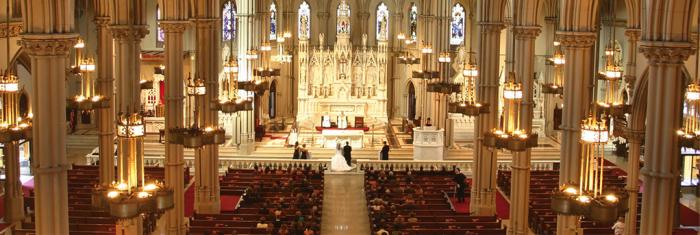
4.21 Pse të zgjedhim celibatin nëse njerëzit janë të krijuar për martesë?
Martesa dhe celibati janë dy mënyra në të cilat një i krishterë mund të ndjekë urdhrin e Zotit për të qenë i frytshëm (Zan. 1:28)Zan. 1:28: Hyji i bekoi dhe u tha: “Shtohuni e shumohuni e mbusheni tokën dhe sundojeni atë! Bëhuni zotëruesit e peshqve të detit, të shpendëve të qiellit dhe të çdo gjallese që lëviz përmbi tokë!”.. Në martesë një burrë dhe një grua i kushtohen njëri-tjetrit në dashuri . Në celibat dikush i kushton veten vetëm dashurisë së Zotit, pa pasur marrëdhënie seksuale.
Falë këtij angazhimi, dikush që ndjek celibatin është i gatshëm të bëjë atë që Zoti kërkon prej tij, në çdo kohë dhe kudo. Priftërinjtë, vëllezërit dhe motrat fetare që i përkushtohen Zotit gjejnë lumturinë e vërtetë në jetën e tyre. Ju mund ta konsideroni këtë një shije të parajsës, ku askush nuk do të martohet më.
Si është formuar populli i Hyjit?
Në Kishë, për caktim hyjnor, janë mbarështuesit e shenjtë që kanë marrë Sakramentin e Urdhrit dhe formojnë hierarkinë e Kishës. Të tjerët quhen laikë. Nga të dy palët vijnë besimtarë, që i kushtohen Hyjit në mënyrë të veçantë me shpalljen e këshillave ungjillore: dëlirësi në celibate, varfëri dhe dëgjesë. [KKKP 178]
Çfarë është jeta e shuguruar?
Është një gjendje jete e njohur nga Kisha. Është një përgjigje e lirë e një thirrjeje të veçantë të Krishtit, me anë të së cilës të shuguruarit i kushtohen krejtësisht Hyjit dhe priren drejt përsosmërisë së dashurisë nën ndikimin e Shpirtit Shenjt. Një shugurim i tillë karakterizohet nga praktikim i këshillave ungjillore. [KKKP 192]
Çfarë i ofron jeta e shuguruar misionit të Kishës?
Jeta e shuguruar merr pjesë në misionin e Kishës nëpërmjet një dhurimi të plotë që u bëhet Krishtit dhe vëllezërve, duke dëshmuar shpresën e Mbretërisë qiellore. [KKKP 193]
A kërkohet celibati për atë që merr Sakramentin e Urdhrit?
Për episkopatin kërkohet gjithnjë celibati. Për presbiteratin, në Kishën e ritit latin, zakonisht zgjidhen njerëz besimtarë që jetojnë në celibat dhe që kanë ndërmend ta ruajnë celibatin për “mbretërinë e qiejve” (Mt 19, 12); në Kishat lindore nuk lejohet martesa pas marrjes së Urdhrit të Shenjtë. Diakonatin e përhershëm mund ta marrin edhe burrat e martuar. [KKKP 334]
How is the one, holy, catholic, and apostolic Church structured?
In the Church there are the laity and clerics (clergy). As children of God, they are of equal dignity. They have equally important but different tasks. The mission of the laity is to direct the whole world toward the kingdom of God. In addition, there are the ordained ministers (clerics), who have the duties of ecclesiastical governance, teaching, and sanctification. In both states of life, there are Christians who place themselves at God’s disposal in a special way through celibacy, poverty, and obedience (for example, consecrated religious).
Every Christian has the duty to bear witness to the Gospel by his own life. But God walks a special path with each person. Some he sends as laymen, so that they might build up the kingdom of God by their family and occupation in the midst of the world. For this purpose, he bestows on them in Baptism and Confirmation all the necessary gifts of the Holy Spirit. Others he entrusts with the pastoral ministry; they are to govern, teach, and sanctify his people. No one can take this duty upon himself; the lord himself must send him on his way with his divine power through holy Orders, so that he can act in the place of Christ and administer the sacraments. [Youcat 138]
Why does Jesus want there to be Christians who live their whole lives in poverty, unmarried chastity, and obedience?
God is love. He longs for our love also. One form of loving surrender to God is to live as Jesus did—poor, chaste, and obedient. Someone who lives in this way has head, heart, and hands free for God and neighbor.
In every age individual Christians let themselves be completely taken over by Jesus, so that “for the sake of the kingdom of heaven” (Mt 19:12) they give everything away for God—even such wonderful gifts as their own property, self-determination, and married love. This life according to the evangelical counsels in poverty, chastity, and obedience shows all Christians that the world is not everything. Only an encounter with the divine Bridegroom “face to face” will ultimately make a person happy. [Youcat 145]
Why does the Church require priests and bishops to live a celibate life?
Jesus lived as a celibate and in this way intended to show his undivided love for God the Father. To follow Jesus’ way of life and to live in unmarried chastity “for the sake of the kingdom of heaven” (Mt 19:12) has been since Jesus’ time a sign of love, of undivided devotion to the Lord, and of a complete willingness to serve. The Roman Catholic Church requires this way of life of its bishops and priests, while the Eastern Catholic Churches demand it only of their bishops.
Celibacy, says Pope Benedict, cannot mean “remaining empty in love, but rather must mean allowing oneself to be overcome by a passion for God”. A priest who lives as a celibate should be fruitful inasmuch as he represents the fatherly character of God and Jesus. The Pope goes on to say, “Christ needs priests who are mature and manly, capable of exercising a true spiritual fatherhood.” [Youcat 258]
Thuaju vëllezërve të mi në emër të Jezu Krishtit që t'i duan gratë e tyre ashtu si Hyji e do Kishën. Nëse dikush është në gjendje të këmbëngulë në dëlirësi për nder të trupit të Hyjit, le ta bëjë këtë me gjithë përulësi ... Le të bëhen të gjitha për lavdinë e Hyjit . [Shën Injaci i Antiokisë, Letër drejtuar Shën Polikarpit (MG 5, 724)]





